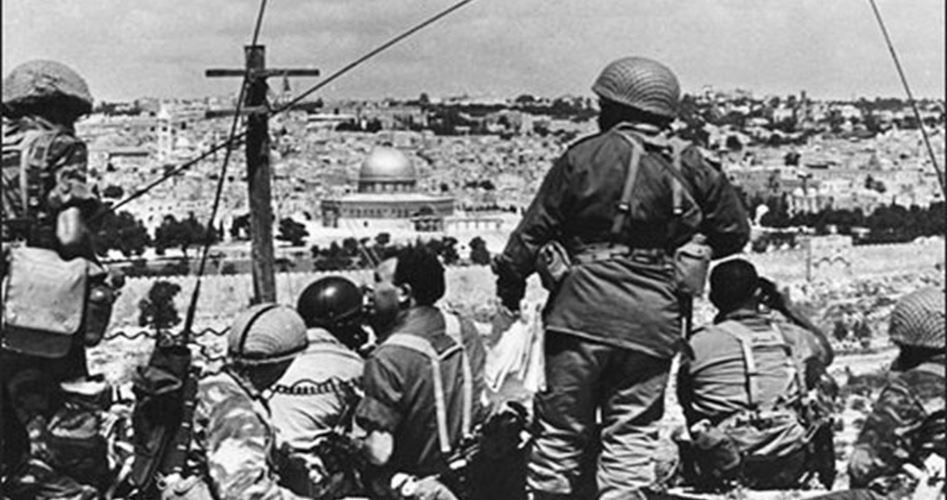The Palestinian people marked the 53rd anniversary of the Naksa (setback) day on Friday — June 5 — remembering the moments when tens of thousands of their relatives and countrymen were displaced from their native areas during and after the 1967 Six-Day War.
The Six-Day War is also known as the June War 1967 Arab–Israeli War or Third Arab–Israeli War and was fought between 5 and 10 June 1967 by Israel (an occupying power) and the neighboring countries of Egypt Jordan and Syria. It resulted in the unfortunate defeat of the Arab armies.
As a result of the war Israel took control of the West Bank east Jerusalem the Gaza Strip Egypt’s Sinai Peninsula and Syria’s Golan Heights. While the first displacement of Palestinians by Jewish terrorist gangs had taken place in 1948 soon after the establishment of the Jewish state the second large-scale displacement happened in 1967.
Despite many UN resolutions asking for its withdrawal from the occupied Arab territories Israel always shows disregard for international law and continues to occupy those lands except for the Sinai Peninsula.
The 1967 war began with an Israeli surprise aerial attack on the Egyptian air force bases in Sinai on June 5 1967. The war which lasted for six days left about 20000 Arabs dead (soldiers and civilians). Israel also lost over 800 soldiers and civilians.
It is believed that during the war 70-80 percent of the Arab armies’ military equipment was destroyed while Israel lost only 2-5 percent of its military arsenal which was provided by Western powers especially the USA.
Around 300000 Palestinians were displaced by the Israeli occupation state from Gaza the West Bank and east Jerusalem and most of them were forced to leave for Jordan.
Based on Palestinian and international reports Israel still occupies over 85 percent of historic Palestine (27000 square kilometers). Just 15 percent of the land is left for Palestinians most of which is also under the Israeli occupation.
Under Israeli occupation the Palestinians suffer from all sorts of daily violations crimes and terrorism at the hands of Jewish settlers and security and military forces.
Some events that led up to the Six Day War
In the months prior to June 1967 tensions dramatically heightened. Israel reiterated its post-1956 position that the closure of the Straits of Tiran to Israeli shipping would be a cause for war (a casus belli). In May 1967 Egyptian President Jamal Abdul-Nasser asked the UN emergency force (UNEF) to withdraw from Sinai announced that the Tiran straits would be closed to Israeli vessels and then mobilized the Egyptian forces along the border with Israel. On June 5 following espionage activities Israel launched a series of sudden airstrikes against Egyptian airfields calling them “preemptive attacks.”
The Egyptians were caught by surprise and nearly the entire Egyptian air force was destroyed with few Israeli losses giving the Israelis air supremacy. Simultaneously the Israelis launched a ground offensive into the Gaza Strip and the Sinai which again caught the Egyptians by surprise. After some initial resistance Nasser ordered the evacuation of the Sinai as Israeli forces moved westward inflicting heavy losses on the Egyptians and invading the Sinai.
Jordan had entered into a defense pact with Egypt a week before the war started; the agreement envisaged that in the event of war Jordan would not take an offensive role but would attempt to tie down Israeli forces to prevent them from making territorial gains. About an hour after the Israeli air attacks the Egyptian commander of the Jordanian army was ordered by Cairo to begin attacks on Israel; in the initially confused situation the Jordanians were told that Egypt had repelled the Israeli air strikes.
Egypt and Jordan agreed to a ceasefire on June 8 and Syria agreed on June 9; a ceasefire was signed with Israel on June 11. In the aftermath of the war Israel’s quick military aggression had crippled the Egyptian Syrian and Jordanian armies having killed over 20000 Arab troops and civilians while losing fewer than 1000 of its own.
The war ended with Israel seizing Gaza and the Sinai Peninsula from Egypt the West Bank and east Jerusalem from Jordan and the Golan Heights from Syria. Israel withdrew from Sinai in 1982 following a peace treaty with Egypt and later in 2005 from the embattled Gaza Strip following repeated counterattacks and commando operations by the Palestinian resistance.













